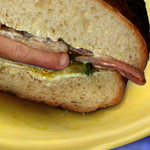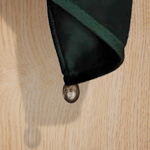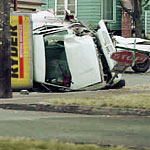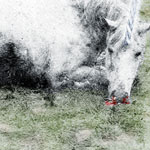 At the base of the hill the long driveway comes to a T. From there it’s possible to turn either left or right to get to town–the direction doesn’t particularly matter because both roads meet up again after after a circuitous half mile. The fact that it’s a loop is the most interesting aspect of that road. Otherwise the two directions are about the same, and there’s nothing that makes one direction more compelling than the other. So it is that each morning is like participating in some recondite experiment: which way to go?
At the base of the hill the long driveway comes to a T. From there it’s possible to turn either left or right to get to town–the direction doesn’t particularly matter because both roads meet up again after after a circuitous half mile. The fact that it’s a loop is the most interesting aspect of that road. Otherwise the two directions are about the same, and there’s nothing that makes one direction more compelling than the other. So it is that each morning is like participating in some recondite experiment: which way to go?
The one thing that saves me from numbing routine is the choice that I have of the two directions. I typically don’t know which way I’ll turn until I reach the bottom of the driveway, and even when I have a vague inkling, I’m often proven wrong. And that’s how I like it. This is one of those few perfect decisions that exists independent of cause or effect, and abrogates entirely the risk of routine.
But I’ve lately come to suspect that the specter of routine hides within the gestalt of my actions, if not in each one individually. It’s a difficult thing to know for sure, but still the suspicion haunts me.
For no discernible reason I began favoring the left route one morning, and stuck with the preference for a long while. Several days had passed before I noticed an elderly woman walking her dog just over the first hill–noticed her because she was always in the same place at the same time. A creature of routine, she was.
As days passed she took notice of me as well, and offered a friendly wave as I passed by. Despite the familiar burden of forced social graces, I waved back that first day, and continued to do so each morning. Meanwhile I worried at my foolhardy flirtation with regularity. Not only that, but I inferred expectation in that old woman’s smile, and it became more and more difficult to take my daily decision without regard to consequence.
A curious feeling of confinement set in–a kind of “claustrophobia of deed”–and my fingers tightened around the steering wheel. I found myself tempted by irrational thoughts, of routine-defying actions. I wondered at the consequences of swerving suddenly into the embankment with none but the woman and her dog as witnesses. Surely that would free me from any possibility of routine, unless I found a way to swerve into the same embankment every day.
Fortunately, the day did come when I turned right rather than left at the end of my driveway. I didn’t realize it until the deed was done, but it was just the beginning of a long run of right-favoring mornings. The drive was uneventful, though I often found myself preoccupied with thoughts about the old lady walking her dog. That she had no seed of variability made her vulnerable. Nature has a way of weeding out homogeneity, and I imagined she would be dispatched in short order. She would fall, and her dog would drag her into the bushes and eat his fill, and then dash away into fields of clover.
It was partially out of curiosity that I took the left route again, after two contiguous weeks of right turns. I felt I had barely avoided a pattern in the making, but still I couldn’t avoid the niggling feeling that my perfect indecision had been tainted by a baser desire to know what was happening on the other side. There was no turning back now.
Over the crest of that first hill I spotted the dog walker again, but this time she did not wave at me as I came fully into view. Instead she stood there with her arms akimbo, and waited for my car to approach. Then, just before I passed her by, she put out one hand as if asking why, and mouthed something like, “Where were you?”
Clearly I had misled the old woman, and now she felt betrayal. I had become a part of her routine, even as I foiled my own. We follow our little furrows, finding our little patterns, and try as we might to avoid them, sometimes even the lack of something is something.
 “How about… mustard? Mayo? And… lettuce?” As if I’m not sure the woman behind the counter has even heard of them. But of course she has. I’ve been ordering exactly the same sandwich here for just shy of four years. Some people study the menu each time they visit a familiar restaurant, but I order only one selection from any given restaurant. The first time I visit an eatery I figure out which item best suits me, and then lock it in. Because of this, ordering no longer requires thought, which would seem to be of great advantage to the introvert grown wary of human interaction. However, once again there are subtle yet vexing expectations relating to social conduct that foil simplicity. The wait staff isn’t aware that my dialogue is pre-scripted, so for them I must pretend to study the menu every time.
“How about… mustard? Mayo? And… lettuce?” As if I’m not sure the woman behind the counter has even heard of them. But of course she has. I’ve been ordering exactly the same sandwich here for just shy of four years. Some people study the menu each time they visit a familiar restaurant, but I order only one selection from any given restaurant. The first time I visit an eatery I figure out which item best suits me, and then lock it in. Because of this, ordering no longer requires thought, which would seem to be of great advantage to the introvert grown wary of human interaction. However, once again there are subtle yet vexing expectations relating to social conduct that foil simplicity. The wait staff isn’t aware that my dialogue is pre-scripted, so for them I must pretend to study the menu every time. The first time I went through a car wash it was simple, because I had no idea what I was doing. That’s how it always is in the beginning. I am a little bird, beak open and pointed skyward. All I have to do is to look clueless and I’ll be told what to do. Drive up to the line? Sure. Align the front tire to the automated track? I think I can manage that. Pay at the other end? No problem.
The first time I went through a car wash it was simple, because I had no idea what I was doing. That’s how it always is in the beginning. I am a little bird, beak open and pointed skyward. All I have to do is to look clueless and I’ll be told what to do. Drive up to the line? Sure. Align the front tire to the automated track? I think I can manage that. Pay at the other end? No problem. I had a friend who was always mindful of the path he took to cross a room. As he navigated between two chairs, around the table clockwise, and over to the coffee maker, an invisible line was drawn behind him like a spider’s thread. Such was his belief. Returning to his origin by a different route would spell entanglement, his efficiency declining throughout the day as he became ensnared in his own past.
I had a friend who was always mindful of the path he took to cross a room. As he navigated between two chairs, around the table clockwise, and over to the coffee maker, an invisible line was drawn behind him like a spider’s thread. Such was his belief. Returning to his origin by a different route would spell entanglement, his efficiency declining throughout the day as he became ensnared in his own past. Seeing a friend off at the train station it occurs to me that there’s a last time for everything. This is the last time I’ll see my friend off, for instance. At least, while I’m standing in this position, wearing these shoes. The next time won’t be the same, because the configuration of elements will be different. An event, after all, is defined by the orientation of its component parts as much as anything. And it’s a good thing too, isn’t it? To repeat something endlessly is to rob it of meaning… or to create a religion.
Seeing a friend off at the train station it occurs to me that there’s a last time for everything. This is the last time I’ll see my friend off, for instance. At least, while I’m standing in this position, wearing these shoes. The next time won’t be the same, because the configuration of elements will be different. An event, after all, is defined by the orientation of its component parts as much as anything. And it’s a good thing too, isn’t it? To repeat something endlessly is to rob it of meaning… or to create a religion. Standing at the rental counter my palms are so slick that my car keys slip to the cracked linoleum with a clatter. I debate whether to leave them there, but the girl waiting on us pauses in the middle of her spiel and levels a pointed look at me. A moment passes. “You need to get those,” she says, and in her urban brogue I’m not sure it’s a question.
Standing at the rental counter my palms are so slick that my car keys slip to the cracked linoleum with a clatter. I debate whether to leave them there, but the girl waiting on us pauses in the middle of her spiel and levels a pointed look at me. A moment passes. “You need to get those,” she says, and in her urban brogue I’m not sure it’s a question. I don’t even know the name of the motel I’ve been staying in. I’m only passing through, but already routine has settled on me like residue. In the morning and at night, as I’m preparing, I find myself stealing glances at the appendage on my bathroom wall. Though the leg remains, the spider two whom it belongs is long gone. As out of place as it is, I can’t summon the will to brush the leg away. Day after day I see it there, next to the mirror. Each time I catch site of it I imagine it’s fastened there by the minutest trace of dried ichor, a bond that a whisper of air might break. But though the temptation exists, I leave the arachnid gam there, perhaps as a reminder.
I don’t even know the name of the motel I’ve been staying in. I’m only passing through, but already routine has settled on me like residue. In the morning and at night, as I’m preparing, I find myself stealing glances at the appendage on my bathroom wall. Though the leg remains, the spider two whom it belongs is long gone. As out of place as it is, I can’t summon the will to brush the leg away. Day after day I see it there, next to the mirror. Each time I catch site of it I imagine it’s fastened there by the minutest trace of dried ichor, a bond that a whisper of air might break. But though the temptation exists, I leave the arachnid gam there, perhaps as a reminder. Okay, I’ll admit it: most of what I know is made up; a complete fabrication as a defensive measure against the alarming banality of truth. As such, the line between the two worlds–between truth and fabrication–is sometimes indistinct. The defining factor seems to be the number of unicorns involved in a given thought. Of course there is no profit in revealing this fact to my adversaries.
Okay, I’ll admit it: most of what I know is made up; a complete fabrication as a defensive measure against the alarming banality of truth. As such, the line between the two worlds–between truth and fabrication–is sometimes indistinct. The defining factor seems to be the number of unicorns involved in a given thought. Of course there is no profit in revealing this fact to my adversaries. Officer… Lindstrom. Her badge catches the sun, and I’m blinking the spot from my eyes when she looks up at me from her small pad of lined paper. “And when did you first see the car?” Her notes are a disconcerting scribble. Do I really talk like that?
Officer… Lindstrom. Her badge catches the sun, and I’m blinking the spot from my eyes when she looks up at me from her small pad of lined paper. “And when did you first see the car?” Her notes are a disconcerting scribble. Do I really talk like that? I used to pretend that my pencil was a rocket. As my Grade 3 teacher broke the world into morsels digestible to eight year olds, I was launching golden missiles into space. I would squint with one eye open and, holding my Ticonderoga by the metal band around the eraser, move it steadily upward into my field of vision. Then, once the lead tip (or “nose cone”) had ascended out of view, I would deftly switch hands, grabbing the tip in my other hand while releasing the engine in time to see it sweep seamlessly by. Persistence of vision provided the illusion of unassisted flight across a constellation of adolescent heads. This business was hardly subtle, and on more than one occasion I was spotted by the teacher, my attention compromised, and made to participate in undesirable activities.
I used to pretend that my pencil was a rocket. As my Grade 3 teacher broke the world into morsels digestible to eight year olds, I was launching golden missiles into space. I would squint with one eye open and, holding my Ticonderoga by the metal band around the eraser, move it steadily upward into my field of vision. Then, once the lead tip (or “nose cone”) had ascended out of view, I would deftly switch hands, grabbing the tip in my other hand while releasing the engine in time to see it sweep seamlessly by. Persistence of vision provided the illusion of unassisted flight across a constellation of adolescent heads. This business was hardly subtle, and on more than one occasion I was spotted by the teacher, my attention compromised, and made to participate in undesirable activities.